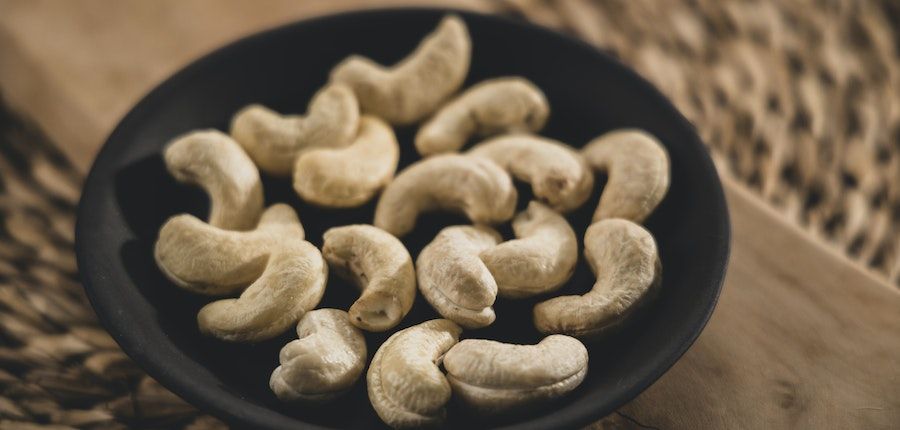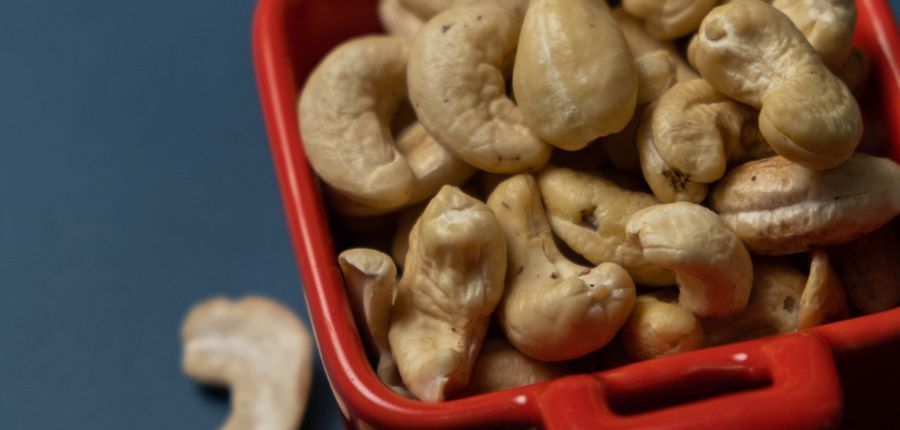Cashews are one of the most versatile and widely used nuts in the world, making them a popular choice among foodies and health-conscious individuals alike. Not only do cashews taste delicious, but they’re also loaded with healthy fats that can help improve your overall health and wellbeing. Here’s our list of the top seven health benefits of eating cashew nuts!
What is a cashew?
A cashew is a seed, or the fruit of an evergreen tree native to northeastern Brazil. In its natural state, the cashew fruit has an outer shell with a shellac-like coating and a hard, inedible seed inside. This is what we call raw cashews.
When the cashews are roasted and salted, their shells come off easily. The softer texture means that they’re easier to chew for people who have difficulty chewing (such as those recovering from a stroke).
Roasting also destroys enzymes called protease that are found in raw nuts and seeds; these enzymes can break down proteins into simpler molecules, which can be problematic for some people who suffer from kidney failure or certain forms of diabetes. As well, roasting cashews allows more heat to penetrate them, so they develop a richer flavor.
One of the health benefits of eating cashews is their anti-inflammatory properties. Cashew nut allergies are rare but can occur if you’ve had previous contact with this type of nut through kissing or other close contact.
There is no cure for a cashew allergy and it can get worse over time if you keep coming into contact with them.
Cashew nutritional value:
Per ounce (28 g) serving of raw cashews provides:
- Calories: 155
- Total carbohydrates: 9.2 g
- Protein: 5.1 g
- Calcium: 10.4 mg
- Iron: 1.9 mg
- Magnesium: 81.8 mg
- Phosphorus: 166 mg
- Potassium: 185 mg
- Sodium: 3.4 mg
- Zinc: 1.6 mg
- Copper: 0.6 mg
- Manganese: 0.5 mg
- Selenium: 5.6 mcg
- Omega-3 fatty acids: 17.4 mg
- Omega-6 fatty acids: 2179 mg
- Cholesterol: 0 mg

1. Cashews are good for your heart:
Cashews are a good source of fat, which is vital for the healthy functioning of your heart. This is because they contain oleic acid, which has been shown to decrease cholesterol levels and reduce the risk of heart attack and stroke.
They also contain other valuable nutrients such as magnesium, copper, manganese and zinc, which all help to regulate blood pressure and keep your arteries free from plaque buildup.
Munching on cashews can also prevent the development of kidney stones. Recent studies have found that eating just one ounces of cashews daily can significantly reduce your chance of developing kidney stones.
In fact, in one study it was found that those who ate nuts like cashews were 66% less likely to develop kidney stones than those who didn’t eat any nuts at all!
2. Cashews can help you lose weight:
Losing weight can be difficult, but cashews might be able to make the process a little easier. This is because cashews are high in fiber, which makes you feel full for longer periods of time.
In addition to this, they are also rich in protein and unsaturated fats. As well as being low in sugar, which means that these nuts won’t cause an insulin spike that could potentially affect your blood sugar levels.
Furthermore, cashews contain iron, magnesium and phosphorus — all nutrients that are crucial for maintaining energy levels during the day. Not only do cashews contain heart-healthy nutrients such as potassium, magnesium and folate, but they are also very low in saturated fat — one type of fat that has been linked to increased risk of cardiovascular disease.
3. Cashews can help you manage diabetes:
Cashews contain high levels of both soluble and insoluble fiber, which aid digestion. They also have a low glycemic index, meaning that cashews will not spike your blood sugar like other sugary snacks can.
Cashewnuts are also rich in antioxidants and omega-3 fatty acids, which help to reduce inflammation and lower the risk for heart disease.
The minerals found in cashews, such as magnesium and copper, can also relieve pain from various conditions, including diabetes. The vitamin E found in cashews is crucial for those with prostate cancer because it helps slow tumor growths.
4. Cashews can improve your bone health:
Cashew nuts are a rich source of dietary calcium, which is important for bone health. Calcium and phosphorus work together to form the hard outer layer of your bones (called cortical bone), giving them structural strength.
When your body doesn’t get enough calcium from food, the bones can start breaking down and thinning out. This process is called osteoporosis, and it’s more common in women because they lose calcium during their menstrual cycle.
5. Cashews are a good source of protein:
Cashews are a good source of protein, meaning that they contain all nine essential amino acids. They also contain high levels of unsaturated fats, the type found in olive oil and avocados.
These fats can help prevent heart disease by lowering cholesterol and triglyceride levels in the blood.
They have more fiber than most nuts. Cashews have 3 grams of dietary fiber per ounce which will help with weight loss and control blood sugar levels.
6. Cashews can help lower cholesterol:
Cashews are high in monounsaturated fats, which have been shown to reduce the levels of LDL cholesterol (the bad cholesterol) in your body.
The fiber content also helps to lower cholesterol levels by binding to bile acids and preventing their re-absorption into the blood stream.
Finally, cashews contain large amounts of copper and magnesium, two minerals that also help lower LDL cholesterol levels.
7. Cashews contain antioxidants:
Cashews are a great source of antioxidants, including oleic acid and polyphenols. Oleic acid is the same antioxidant found in olive oil, which has been shown to help reduce cholesterol levels and lower the risk of heart disease.
Polyphenols are also linked to reduced inflammation, a known factor for many chronic diseases such as cancer and diabetes.
The main reason cashews are so nutritious is because they’re packed with fiber. In fact, a single ounce contains 3 grams of it!
Fiber helps regulate bowel movements and keeps you feeling fuller longer. It also plays an important role in reducing the risk for colon cancer.
How to make cashew milk?
Cashew milk is a delicious alternative to dairy-based milks, and it’s surprisingly easy to make. All you need are cashews, water, a high-speed blender, and a pinch of sea salt!
To prepare cashew milk follow these simple steps:
- Soak the cashews in water for at least an hour or overnight.
- Add the cashews and 4 cups of fresh water to a high-speed blender. Blend until smooth.
- Add more or less water if necessary to get desired consistency. It should be rich and creamy but not too thick.
- Once blended, strain the mixture through a nut bag or fine mesh sieve lined with cheesecloth into another container (a pitcher will work).
- Stir in 1/4 tsp. sea salt and refrigerate up to three days.
How to make cashew butter?
Cashew butter is one of the most beneficial nut butters out there and it’s easy to make at home. Here are five health benefits you’ll get from eating cashew butter:
- Improves digestion.
- Reduces risk of heart disease.
- Helps prevent cancer.
- Keeps skin healthy.
- Strengthens bones as they have high amounts of copper, which helps keep bones healthy by forming collagen. Collagen provides strength and structure to bone tissue, as well as being important for wound healing.
To prepare cashew butter, all you need is raw cashews and quality oil like coconut or avocado oil. Process your raw cashews in a food processor until they turn into a smooth paste or spreadable consistency with some chunks left intact.
Add oil while processing to create your desired consistency. Cashew butter should be stored in an airtight container at room temperature or refrigerated for up to three weeks if unopened.
When ready to eat, enjoy on apples or bananas, mixed into oatmeal, or paired with cereal. Or better yet, try these yummy recipes below!
- Cashew butter apple bites.
- Raw sweet potato pie.
- Chocolate cupcakes with peanut butter frosting.
- Coconut lemon mousse.
- Oven roasted veggie pizza.
- Gingerbread pancakes.
- Nutella banana toast.
Cashew recipe:
Mix together four tablespoons unsalted butter, four tablespoons granulated sugar, four tablespoons light brown sugar, one egg, one teaspoon vanilla extract and then add salt and baking soda to taste.
Stir in the flour. Divide dough in two and press into two 9-inch cake pans. Bake at 350°F for 25 minutes or until golden brown. Spread frosting over cooled cake layers, frost tops and sides with remaining frosting; sprinkle pecans on top of frostings.
Conclusion
Cashews have long been considered one of the healthiest types of nuts, particularly because they are rich in nutrition that benefit both your heart and your brain. One cup of cashews contains nearly twice as much copper as a cup of lentils.
Other essential minerals that can be found in this nutritious snack include manganese, zinc, iron and phosphorus. One ounce (approximately 20-25 nuts) has only 155 calories!
